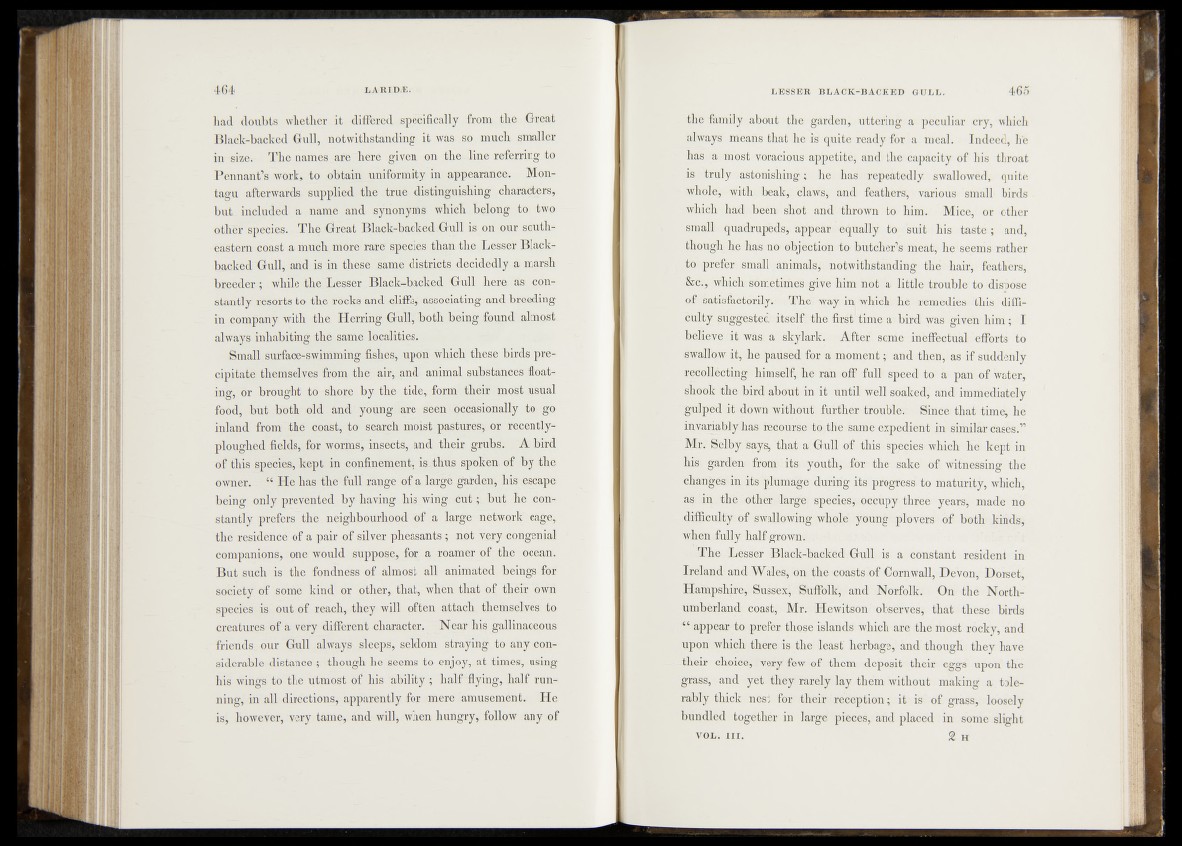
had doubts whether it differed specifically from the Great
Black-backed Gull, notwithstanding it was so much smaller
in size. The names.are here given, on the line referring to
Pennant’s work, to obtain uniformity in appearance. Montagu
afterwards supplied the true distinguishing characters,
but included a name and synonyms which belong to two
other species. The Great Black-backed .Gull is on our southeastern
coast a much more rare species than the. .Lesser Black-
backed Gull, and is in these same districts decidedly a marsh
breeder; while the Lesser Black-backed Gull here, a's constantly
resorts to the rocks and cliffs,' associating and breeding
in company with the Herring Gull, both being found almost
always inhabiting the same localities.
Small surface-swiffiming-fishes, upon which these birds precipitate
themselves from the air, and animal substances floating,
or brought to shore by the tide, form their most usual
food, but both old and young are seen occasionally to go
inland from the coast, to search moist pastures, or recently-
ploughed fields, for worms, insects, and their grubs. A bird
of this species, kept in confinement, is.thus spoken, of by the
owner. “ He has the full range of a large garden, his escape
being only prevented by having his wing c u t; but he constantly
prefers the neighbourhood of a large network cage,
the residence of a pair of silver pheasants; not very congenial
companions, one would suppose, for a roamer of the ocean.
But such is the fondness of almost all animated beings for
society of some kind or other, that, when that of their own
species is out of reach, they will often attach themselves to
creatures of a very different character. Near his gallinaceous
friends, our Gull always- sleeps, seldom straying to any considerable
distance ; though he seems-to enjoy, at times, using
his wings to the utmost of his ability; half“flying, half running,
in all directions, apparently for mere amusement.- He
is, however, very tame, and will, when hungry, follow any of
465
the family about the garden, uttering a peculiar cry, which
always means that he Is1 quite ready for a meal. Indeed, he
has a most voracious appetite, and the capacity of his throat
is truly astonishing; he has repeatedly swallowed, quite
whole, with beak, claws, and feathers, various small birds
which had been shot and thrown to him. Mice, or other
small quadrupeds, appear equally to suit his ta s te ; and,
though he has no objection to butcher’s meat, he-seems rather
to prefer small animals, notwithstanding the hair, feathers,
&c., which sometimes give him not a little trouble to dispose
of satisfactorily. The way in. which he remedies this difficulty
jpfiggested itself, the first time a- bird was given him ; I
believe "it was a skylark. After some ineffectual efforts to
swallow it, he paused for a moment; and then, as if suddenly
recollecting himself, he rah off full speed to a pan of water,
shook the bird about in it until well soaked, and immediately
gulped it down without further trouble;': Since that time, he
in variably has'recourse to. the same expedient in similar cases.”
Mr." Selby says, that a Gull of this species which he kept in
his garden from , its youth, for the sake of witnessing the
changes in its plumage during its progress to maturity, which,
as in the other large species, occupy three years, made no
difficulty of swallowing whole young plovers of both kinds,
when fully half grown. .
The Lesser Black-backed Gull is a constant resident in
Ireland and Wales, on the coasts of Cornwall, Devon, Dorset,
Hampshire, Sussex^ Suffolk, and Norfolk. On the Northumberland
coast, Mr. Hewitson observes, that these birds
<c appear to prefer those islands which are the most rocky, and
upon which there is the least' herbage, and though they have
their choice, very few of them deposit their eggs upon the
grass, and yet they rarely lay them without making a tolerably
thick nest for their reception; it is of grass, loosely
bundled together in large pieces, and placed in some slight
vol. in . g h